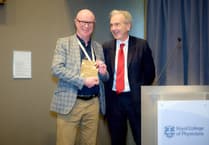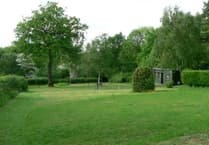A DISPUTE over the future of a farm on the edge of the Forest which tore a family apart has been settled by the highest court in the land.
David and Josephine Guest, who own Tump Farm at Sedbury, went to the Supreme Court in a bid to overturn an earlier judgment which had found in favour of their son Andrew.
But a panel of five Supreme Court justices has rejected the core of their appeal in a decision that will have significant consequences in an area of law known as proprietary estoppel.
The case hinged on a promise made to Andrew Guest that he would inherit part of the 197-acre farm which his family has worked since 1938.
Some 25 years after the promise was made, Andrew Guest was cut out of his father’s will.
After leaving school at 16, Andrew worked long hours at less than minimum wage in the expectation of inheriting part of the farm.
His parents had argued the court should settle the dispute on the basis of the detriment he had suffered by not setting up his own business or getting job elsewhere.
Their son’s case was that his expectation of an inheritance should determine the outcome.
The Guests’ appeal was partially upheld on the ground of accelerated receipt of Andrew’s inheritance during their lifetimes – something which they had never promised to do.
The Supreme Court found that the High Court Judge had gone beyond what his discretion allowed by failing to adequately discount Andrew’s awarded sum to reflect accelerated receipt during his parents’ lifetimes.
The Supreme Court held that Mr and Mrs Guest should either pay a reduced sum to their son now or hold his share of the farm on trust for their lifetimes.
Mr Thomas Dumont KC, for Mr and Mrs Guest, argued at the hearing in December last year: “The shattering of the dreams is not a proper rational basis on which proprietary estoppel can be conducted.”
But handing down judgement, Lord Briggs said: “In a case like the present the harm consists of the soul-destroying, gut-wrenching realisation of being deprived, and then actually being deprived over the rest of a lifetime, of an expected inheritance of land upon which the promisee has spent the whole of his life and work to date and which, in due course, he expected to be able to pass on to one or more of his own children, making the same promise to them as his father made to him.”
When the relationship between Andrew and his parents broke down in 2015, he was told to find another job, move his family out of the farm’s cottage, the farming business partnership was dissolved and he was disinherited.
Now aged 56, Mr Guest, who has a brother and sister, lives with his wife Tracey in Wanborough near Swindon, and works as a herd manager.
At the court hearing, Mr Dumont, for Mr Guest’s parents, said that from 2000 Andrew Guest got a higher income from the farm than his father or brother.
He said: “The family farm was run by the family and the profit from that farm was divided on a fair basis among the family with Andrew getting slightly more.
“It was not one of those paradigm cases where someone is made to work for nothing or for very little.’’
Agriculture specialists Polly Ridgway, Daniel Gill and Esther Woolford, of national law firm Clarke Willmott LLP, represented Andrew Guest at the High Court trial, the Court of Appeal hearing and the Supreme Court appeal.
Polly Ridgway said: “Andrew’s parents put in place a series of measures which were designed to leave Andrew, in his 50s, with no home, no job, no savings, and no pension, despite a lifetime of hard work.
“Thankfully, the Supreme Court was prepared to use its powers to prevent this clear injustice and, as a result, Andrew will receive his inheritance promised to him either now (as an accelerated sum) or on his parents’ deaths.
‘‘We are delighted to have helped Andrew achieve this result.
“Aside from being a significant decision in this area of law, the case also highlights the need for those involved in or contemplating bringing inheritance disputes to get expert legal advice as soon as possible so as to avoid the situation Andrew’s parents now find themselves in.”
in the judgement, Lord Briggs said: “This was a case where, by 2015, Andrew had spent over 25 years working for his father on minimal wages, with incalculable whole-life consequences in terms of the sacrifice of opportunities for an independent career and the ownership of his own home.
“It is simply impossible to identify some monetarised value of his detriment in a way which would render a fulfilment of his expectations disproportionate.”
Explaining the proceedings, the Lord Justice said one of the functions of equity was to put right injustice which a strict application of the law would not recognise.
While Mr Guest was free to break his promise by both evicting his son and changing his will, equity dictated that his son with a remedy if he acted to his own detriment on the basis of what had been promised.
The remedy is called proprietary estoppel. The word “proprietary” reflects the fact that the remedy is all about promises to confer interests in property, usually land.
Estoppel is the notion that the equitable solution is to stop or “estop” the person who has made the promise from going back on it.
According to Andrew Guest’s legal team, the Supreme Court has “firmly rejected” the theory that the remedy for proprietary estoppel cases is to compensate for detriment suffered.
“In this high-profile proprietary estoppel case, following a High Court trial and an appeal to the Court of Appeal, the Supreme Court has determined that the correct approach to framing a remedy is based on Mr Guest’s expectation of inheritance rather than the detriment-based approach put forward by his parents.
“The Supreme Court ruled that Andrew was entitled to his inheritance because his parents had repudiated on their promise that one day Andrew would inherit the farm.
‘‘The Supreme Court confirmed that the aim of proprietary estoppel is to remedy the unconscionable conduct of the promisor by satisfying the expectation of the promisee who had relied on that assurance to his/her detriment.’’




